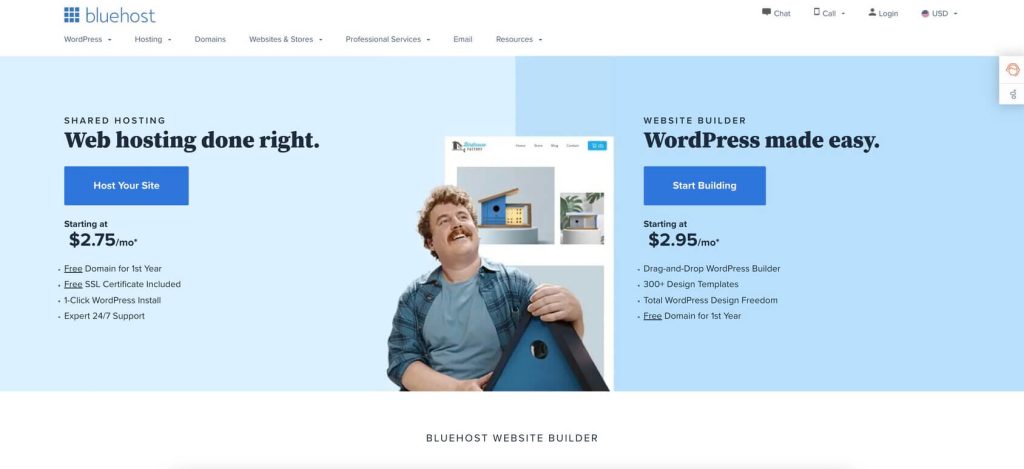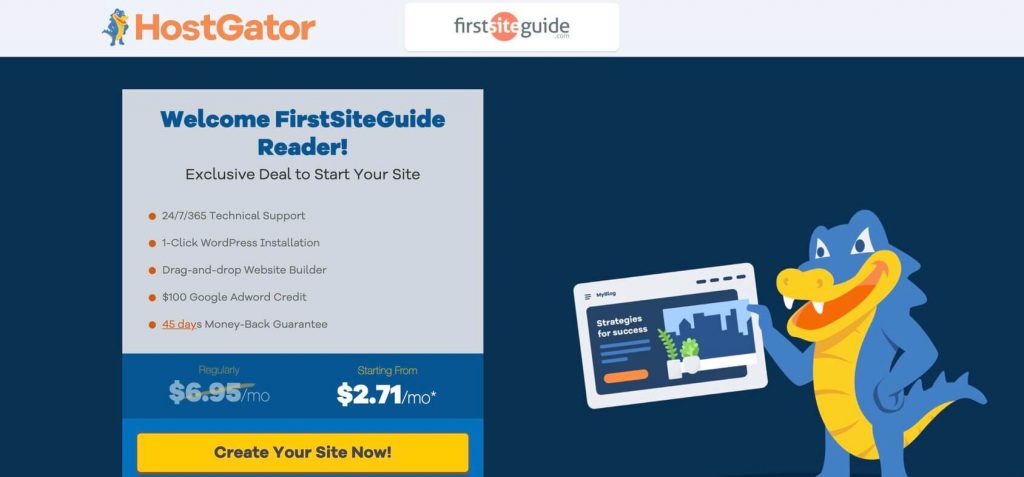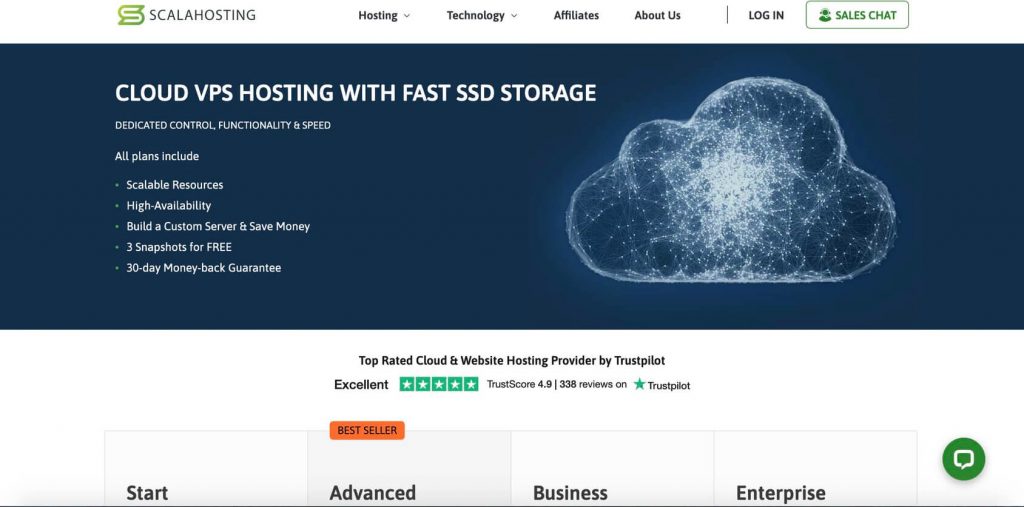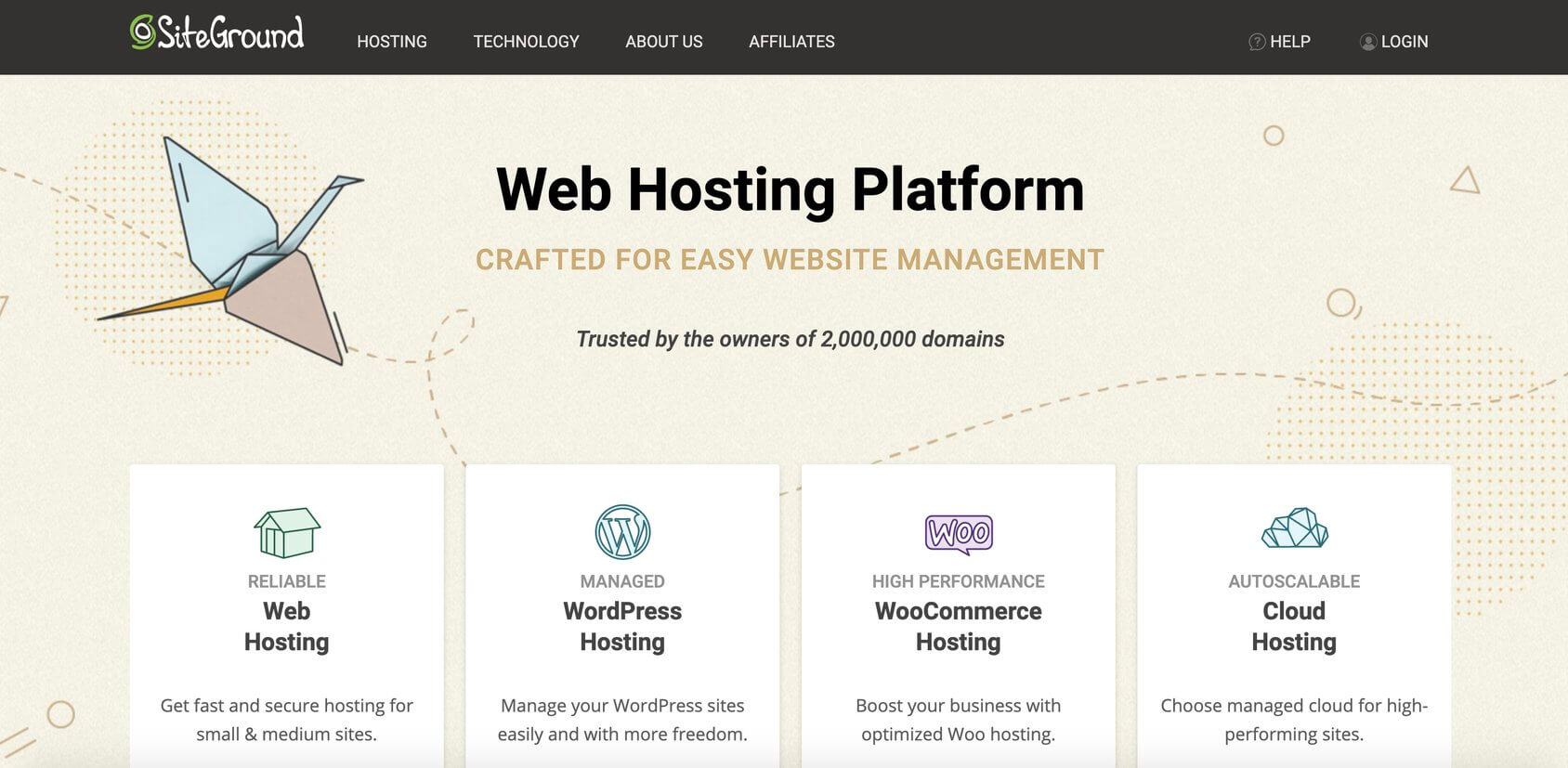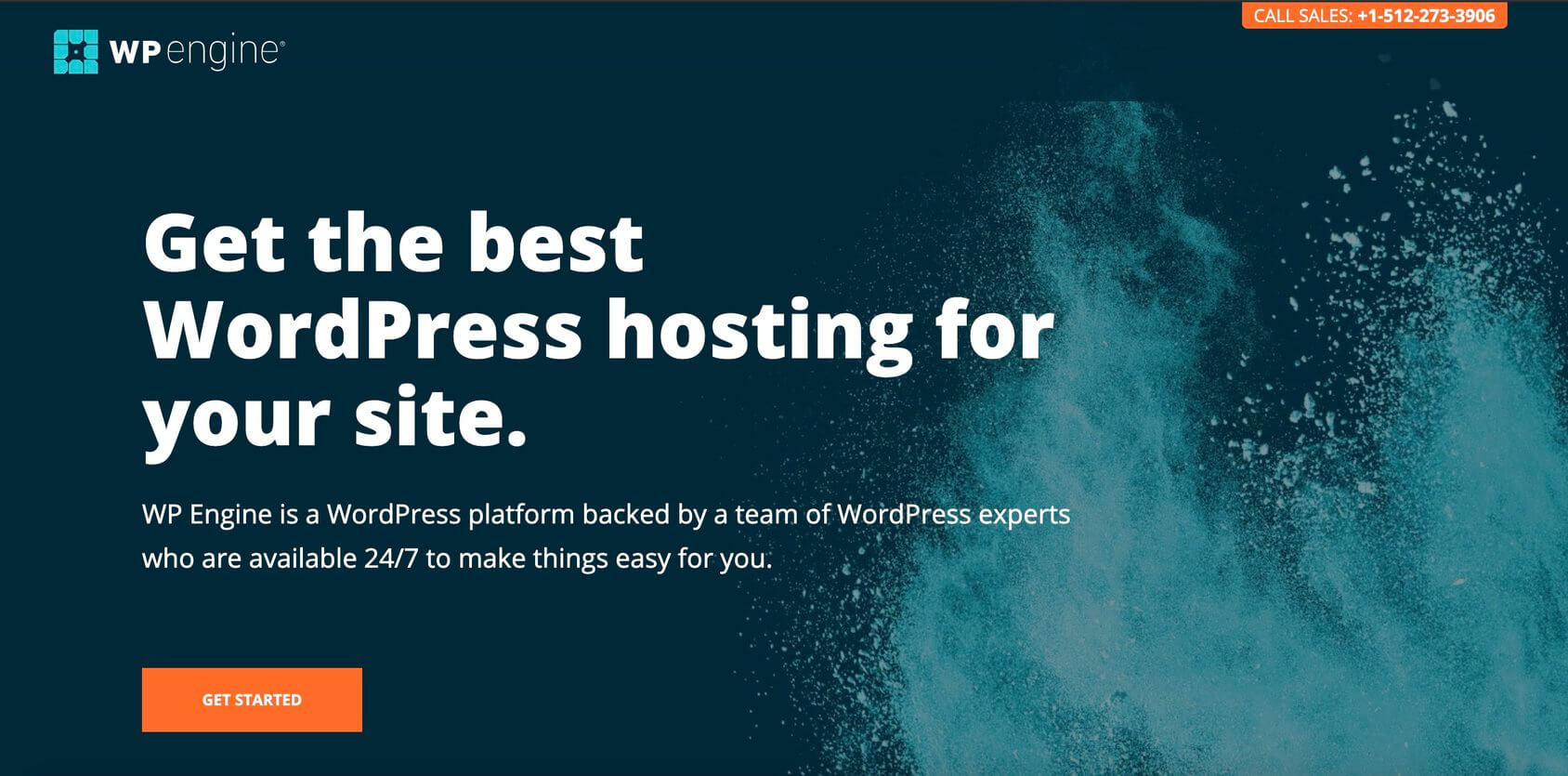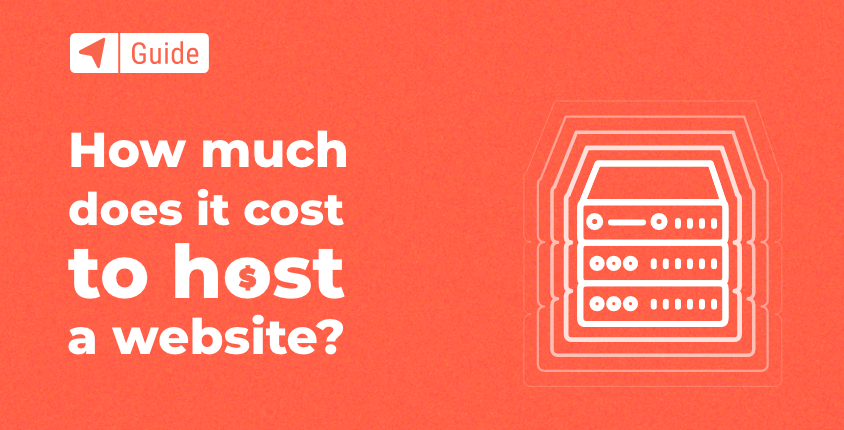
Whether you’re running a large company, a small eCommerce startup, or just want to share your thoughts with the rest of the world in the form of a blog, you need to make a website that attracts attention and engages your audiences.
You need to create a website with excellent loading speeds, advanced privacy and security, and seamless performance with reliable uptime. That’s only possible with a trustworthy web hosting service provider.
Web hosts provide you with servers that store your site, process all file requests, and keep your website up and running. Of course, all of this comes at a cost, which could be a determining factor in choosing your hosting provider.
Costs of web hosting differ from one provider to the next, and they depend on many factors – the types of services you require, additional features such as domain name, and the overall quality of the web host.
So, let’s see how much you can expect to spend on hosting a website and go over some of the best hosting providers across different categories.
Table of contents
- Costs of web hosting
- What to look for in hosting services
- Different hosting needs
- Types of hosting services
- Best hosting providers and their pricing
- FAQs
- Conclusion
Costs of web hosting
When building a website, you’ll need to spend hundreds of dollars solely on website development. If you want a feature-rich website with eCommerce capabilities, custom widgets, and unique integrations, you could easily end up spending several thousand dollars. Once you add hosting and domain name registration costs, the ultimate price quickly stacks up.
So, you’ll want to consider all of the costs carefully, and prep your budget accordingly, especially since hosting is an ongoing expense.
Unfortunately, this can be easier said than done. It’s challenging to gauge exactly how much you’ll spend on hosting services since the prices vary significantly from one provider to the next. If you’ve been looking into hosting providers, you’ve likely noticed that their subscription plans range from just a few cents to a couple of thousand dollars a month.
Should you spend as much as possible on hosting? Are more expensive services always the better option? It depends.
An array of factors impact the price of hosting services, including:
- Available bandwidth, CPU, RAM, and SSD storage;
- Length of subscription (monthly web hosting is typically more expensive than yearly hosting);
- Type of hosting service (VPS/shared/cloud/managed/dedicated);
- Scalability options;
- Security features; and
- Extra features (like SEO tools).
Shared hosting service with low bandwidth and only the basic features will rarely go over a few dollars a month, and it could be more than enough if your website is small with low traffic. There’s no need to pay more for hosting since you won’t get much return on your investment.
However, if you’re running a large eCommerce site that handles hundreds of daily visitors and needs to process transactions, collect customer data, and more, spending as much as $2,000/month can be well worth it.
At the end of the day, how much you’ll spend depends entirely on your unique needs and preferences.
What to look for in hosting services
Regardless of the price point you’re going for, there are a few essentials that you’ll need to consider when hosting your website with a service provider. You’ll have a vast array of options to choose from with countless different features and capabilities. Below are some of the most critical things you’ll need to consider.
Amount of storage
A web host is essentially where your website lives and where all of your pages and files are stored. Just like you need plenty of space in your home to put all of your furniture and decor, your website needs adequate space for everything that’s on it – images, videos, GIFs, PDFs, and more. So, you’ll need to pay very close attention to the amount of SSD storage you’re getting with your hosting subscription.
A small site shouldn’t need more than 1 or 2GB of space. That’s more than enough for a blog page where you post several times a week. A more extensive site with multiple pages, subdomains, and plenty of video and audio files will need much more.
When calculating your storage needs, you’ll need to consider both the average size of individual pages and the average number of daily visitors. If your average page is, for example, 1MB, and it gets about 1000 daily visitors, your daily storage needs are about 1GB, meaning you’ll need approximately 30GB per month to keep your site running smoothly.
Reliability
Reliability isn’t a separate item you’ll see listed on your monthly hosting bill, but it does impact the price, one way or another. Hosting providers with excellent reliability and close to 100% uptime will often carry a hefty price tag. However, it’s the cheaper, unreliable providers that will turn out to be the more expensive option in the long run.
Depending on your website and how much traffic you have, a few hours of downtime a month could significantly impact your bottom line. For 25% of enterprises, a single hour of server downtime costs between $301,000 and $400,000.
When researching reliability, make sure to pay close attention to the hosting server’s uptime percentage. 99.999% uptime equals 5.25 minutes of downtime a year, while 99.99% is 52 minutes and 36 seconds annually.
Security
It doesn’t matter what kind of site you have – ensuring its security should always be your number 1 priority. Some security aspects like network protocols, malware scanning, firewalls, and spam filtering need to be added when you’re developing the site. However, other elements should be covered by your web host.
Most commonly, your web host should give you a free SSL certificate, at the very least. Some hosts will also offer paid extras like firewalls, CDNs, DDoS attack protection, and PCI compliance, but providers’ security offers vary significantly.
A few other things you’ll want to look into when choosing your web host include scalability options, level of support, and the type of backup your site would be getting. Additionally, examine the hosting server you’d be getting and its speed, whether you can register a domain name through your provider, and whether you’ll have access to limited or unlimited plans.
Different hosting needs
When choosing your website hosting service provider, you’ll need to do a bit of introspection before looking into its prices and features. After all, the hosting needs of a small personal blog and a large enterprise will be quite different.
So, determine what kind of site you’re building. Who will be your primary audience? How many daily visitors do you expect to have? Will most of your pages be short blog posts or extensive, media-rich guides and tutorials about using your products and services?
Your website will dictate your hosting needs and, subsequently, the price of your hosting services.
If you use a premium, $1000 plan for a small blog page with a few dozen monthly visitors, you’ll be wasting a lot of money without getting anything in return. On the other hand, if you use a basic, feature-light plan for an eCommerce website with thousands of visitors, your servers will quickly become overwhelmed, and your site will have more downtime than uptime, eventually costing you thousands of dollars in missed profit.
Neither scenario has a positive outcome, making it evident just how critical it is to assess your hosting needs before committing to a service.
Personal website hosting
When hosting a small personal website, you don’t need any advanced features. A few GB of storage, good uptime, and basic security features are more than enough for beginners just dipping their toes into the hosting waters. In this case, you wouldn’t have to spend more than about $3/month for a standard shared hosting plan.
For example, if you’re building a website on WordPress (WP), you can even get free hosting, although it does come with a few drawbacks. Free WP hosting gives you only 3GB of storage, your site will be filled with ads (that you won’t get money from), you won’t be able to sell any ads on your site, and you cannot upload any custom themes or plugins.
So, even in this case, it’s best to use paid hosting services. Fortunately, there are plenty of affordable WordPress hosting services that’ll provide you with everything you need to get started with a new personal website.
Small business site hosting
If you’re running a small business, your hosting needs will be slightly more extensive. For instance, it wouldn’t be in your best interest to use free WP hosting since it could tarnish your credibility. You wouldn’t have your own unique domain name, but rather a subdomain that would look like yourdomainname.wordpress.com. You wouldn’t get eCommerce capabilities, payment gateways, or even your own tracking platform like Google Analytics.
So, when choosing a hosting provider for your small business website, you’ll need to start looking into more professional options. Some of the key features to look for include:
- At least 30GB SSD storage;
- 24/7 support;
- Free SSL certificate;
- Content management system; and
- Unlimited bandwidth.
Additionally, it’s a good idea to look into your scalability options, especially if you’re thinking about enhancing your marketing efforts to boost website traffic. You’ll want a hosting solution that can grow together with your business.
While it’s always possible to switch hosting providers if you’ve outgrown the current one, you could incur unexpected costs, waste time, and risk too much website downtime. Ideally, you’ll want your transition to a more extensive hosting service to be seamless.
eCommerce site hosting
The global eCommerce market is growing at an exponential pace. In 2020, global eCommerce sales amounted to $4.28 trillion, and the numbers keep rising. Your competition in this industry is fierce, so you’ll need to ensure that every website visitor you get has an impeccable experience every time they come to your site. Of course, this means that you’ll need a reliable hosting provider that offers all of the necessary eCommerce features.
Free solutions are unacceptable for eCommerce hosting as they don’t have nearly the level of reliability and performance of premium providers.
Some of the essential features an eCommerce hosting solution should have include:
- SSL certificate;
- Shopping cart functionality;
- Secure payment gateway;
- Extreme speed;
- Unlimited bandwidth and storage;
- 99.999% uptime;
- 24/7 support;
- Email address matching your domain;
- SEO features;
- Automated backup; and
- Scalability options.
Your eCommerce website will need to be fast, trustworthy, and online at all times. Just a few minutes of downtime could cost you hundreds of customers, and just a minor security glitch could damage your reputation and significantly affect your sales.
It’s critical to invest in a high-quality web hosting service provider that will keep you competitive at all times.
Large business site hosting
Finally, when hosting a large business website, there’s no excuse not to use premium services. You have a reputation to maintain, and you must show your clients and customers that you value them every step of the way.
You need a fast, responsive website that’ll answer all of your customer queries in an instant. You need reliable security features that’ll help you keep sensitive customer data protected at all times. You need full site backup in case of an emergency and premium features to ensure the utmost customer satisfaction.
Ideally, you’ll use dedicated hosting that gives you complete control over your servers. It’s the most expensive solution, but one that’s well worth it. You’ll need an experienced in-house team to manage and maintain your site, meaning your overall hosting costs will be higher. However, you’ll benefit from enhanced performance and security.
Types of hosting services
For your site to be visible and available to all visitors, it needs to be stored on a web server. When internet users use their browser to type in your web address (aka your domain name), they connect to that server. The server then processes their request, retrieves the page files the user asked for, and sends the information back to them.
Hosting providers essentially rent out the space on their servers, allowing you to keep your site online without requiring you to invest in building your own hosting solution. Of course, few website owners will need to rent out an entire server. They need only a tiny fraction of the server space in most instances, meaning that a single server typically has more than one user.
Considering that different websites have unique hosting needs and preferences, it’s not surprising that you have access to several hosting solutions. Some will be better suited to you than others, so you’ll need to assess your needs carefully before settling on a solution.
Let’s take a look at the most common types of hosting services and examine what they have to offer.
Shared hosting

Starting at $2 per month
Shared hosting is the most popular and often the most affordable type of web hosting. It’s most commonly used for personal blogs and small business websites.
As its name would imply, shared hosting means that you will share all server resources with many other users. The bandwidth, RAM, CPU, and SSD storage, among other resources, don’t belong just to you. They’re distributed among however many websites are hosted on the given physical server.
This allows hosting providers to keep their prices for shared hosting relatively low. While this hosting solution has obvious cost-saving benefits, it’s not always the best solution for everyone.
Since you’ll be sharing all server resources with other users, if anyone experiences a significant burst in traffic, it could overwhelm the server and cause your site to lag. You can expect higher-than-usual downtime, lower quality customer support, and software compatibility issues.
As a general rule of thumb, shared hosting is a good option for beginners. However, be prepared to either change your hosting provider or upgrade to a more expensive plan once your site starts growing.
VPS hosting

Starting at $20 per month
Virtual Private Server (VPS) hosting is a subtype of shared hosting solutions. You’ll still share the physical server with several other users, but you’ll enjoy greater flexibility.
Typically, VPSs have fewer users, meaning there’s less risk of overwhelming a server and causing it to lag or malfunction. Additionally, while all of the users share the underlying hardware, everyone gets their own software. Every VPS has its own separate operating system and applications and comes with a predetermined portion of the server’s resources.
Your site should handle larger traffic hikes, though it could still suffer lower performance if there’s a sudden, significant rise in the number of visitors.
Most commonly, VPS hosting starts from $20/month and could go up to $80/month. It’s a good solution for small business websites that need more flexibility but aren’t ready to take on the costs or the responsibilities of dedicated hosting.
Cloud hosting

Starting at $5 per month
Cloud hosting is a step up from VPS hosting and another subtype of shared hosting. However, it offers better performance and more versatility.
Whereas with hosting solutions such as shared and VPS hosting, you’re using a single physical server together with several other customers, with cloud hosting, you’re using several servers that are connected virtually.
Cloud hosting is a network of servers that use their combined computing resources to keep your site up and running. Your pages and files aren’t located on a single server but rather spread across several of them. You’re still sharing all those servers with other users, but you have more space and resources.
Additionally, if one server gets overwhelmed, the entire network will have only slightly reduced resources, leaving your site virtually unaffected. Your uptime should still be over 99.99% regardless of the resources the other users consume or how much your traffic spikes.
Perhaps the most significant benefit of cloud hosting is that the solution is scalable and flexible, allowing your site to grow without obstructions. Even the pricing is more flexible than you might expect since you’ll only be paying for the resources that you actually use.
Cloud hosting usually starts at about $5/month for small sites, but it could rise to several hundred a month depending on the resources your site needs.
The most common users of cloud hosting are small and medium-sized businesses.
Dedicated hosting

Starting at $80 per month
Dedicated hosting is often the best solution for large businesses and eCommerce websites. It gives you complete control over your website since you won’t have to share any computing resources with other clients.
With dedicated hosting, you get the entire physical server to yourself. The only site that’s stored on it is your own, so you won’t have to worry about other users overcrowding your server or impacting your site’s performance.
You’ll have full admin access, and you’ll even be able to choose your operating system, applications, security features, and more.
Of course, there’s a drawback. Having complete control also means taking on the brunt of managing your server. You’ll either have to be pretty tech-savvy yourself or have an experienced in-house team to manage your server.
Dedicated hosting is one of the most expensive solutions you’ll encounter, with the basic plans starting at $80/month and going up to several thousand, depending on your needs.
Managed hosting

Starting at $15 per month
If you want to take your dedicated hosting services up a notch, you could opt for managed hosting. You’d still be getting a dedicated server that’s entirely your own, and you can still choose your OS, applications, and security features. However, with managed hosting, you’ll also get server management services.
Your hosting provider will handle admin tasks, server maintenance, provide technical support, and take care of the hardware/software setup and configuration.
Managed dedicated hosting typically goes for around $20-$50/month, although it could be much more expensive depending on your needs.
It’s the best solution for eCommerce and larger businesses that don’t have the technical expertise to maintain their servers but need a dedicated solution.
Best hosting providers and their pricing
With a clear understanding of what different web hosting solutions entail, let’s get into some of the best web hosting services available and check their pricing options.
Shared hosting
In the world of shared hosting, three providers stand out:
1. Bluehost – Starting at $2.75 per month
Bluehost has been one of the leading shared hosting providers for the past 15 or so years. It’s renowned for its affordable pricing plans and customized solutions. Currently, it boasts over 1.2 million users. Some of its key features include:
- Free unlimited SSL;
- Free domain name (first year);
- SSD storage starting from 50GB;
- Unlimited bandwidth; and
- 30-day money-back guarantee.
2. DreamHost – Starting at $2.59 per month
DreamHost was established back in 1997 and quickly grew to become the hosting giant it is today. It currently hosts well over 1.5 million websites and boasts over 400,000 satisfied customers. Its main features include:
- Free domain registration in the first year
- Unlimited website traffic
- WP website builder
- Free WP migrations; and
- 1-click WP installer.
3. HostGator – Starting at $2.71 per month
HostGator has been in the business for almost two decades. It’s the proud host of over 2.5 million websites and enjoys an impeccable reputation among its customers. Its key shared hosting features include:
- Free domain name registration;
- Free SSL certificate;
- Unmetered bandwidth;
- Unlimited storage; and
- 99% uptime guarantee.
Pricing comparison:
| Basic plan | Standard plan | Pro plan | |
| Bluehost | $2.75/month (1 yr term) | $3.95/month | $9.95/month |
| DreamHost | $2.59/month (3 yrs term) | $3.95/month | n/a |
| HostGator | $2.71/month (3 yrs term) | $3.88/month | $5.83/month |
VPS hosting
VPS hosting is becoming an increasingly popular web hosting solution, and it is offered by the following companies:
1. Bluehost – Starting at $18.99 per month
Bluehost is one of the largest hosting service providers on the market, holding over 2 million domains. Moreover, it’s the official WP recommended provider, so your site will be in great hands on Bluehost. Some of its key features for VPS hosting include:
- Multi-server management;
- 24/7 VPS support;
- Intuitive dashboard;
- Unlimited domains and websites; and
- Dedicated server resources.
2. ScalaHosting – Starting at $26 per month
Launched in 2007 with the aim of making hosting available to everyone, from students barely making ends meet to large businesses, ScalaHosting provides reliability, affordability, and scalability. Its main features include:
- Regular server maintenance;
- Automatic daily backups;
- Dedicated IP address;
- 99.9% uptime; and
- On-demand scalability.
3. InMotion – Starting at $19.99 per month
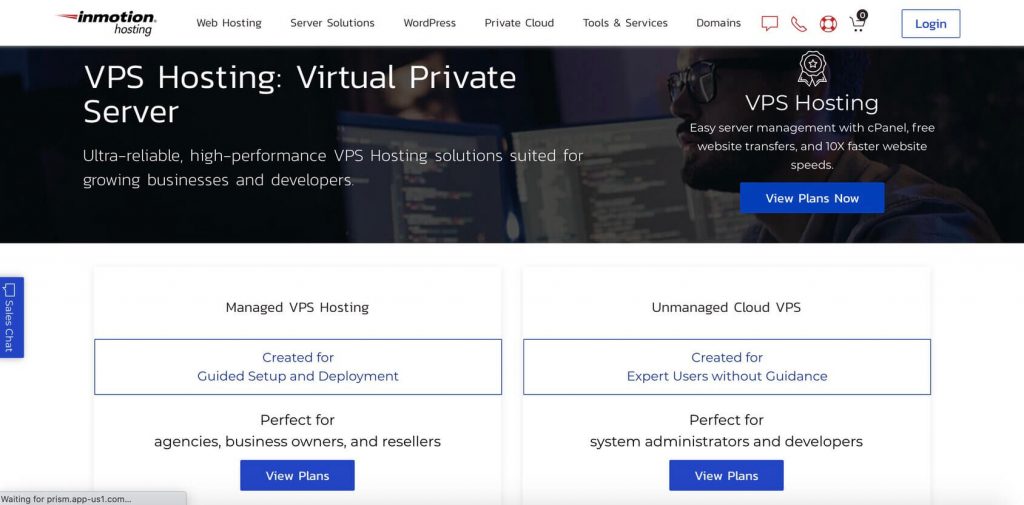
With two decades in the industry, InMotion Hosting has established an excellent reputation among its customers. It has servers in over 175 countries, and its main features are as follows:
- CPU cores starting from 2GB;
- RAM starting from 2GB;
- SSD storage starting from 45GB;
- Bandwidth starting from 1TB; and
- Free site transfers and server setup.
Pricing comparison:
| Basic plan | Standard plan | Pro plan | Expert plan | |
| Bluehost | $18.99/month (3 yrs term) | $29.99/month | $59.99/month | n/a |
| ScalaHosting | $26/month (monthly term) | $30/month | $42/month | $68/month |
| InMotion Hosting | $19.99/month (3 yrs term) | $29.99/month | $44.99/month | $59.99/month |
Cloud hosting
Cloud hosting has become quite the buzzword in the hosting community. Commonly praised for providing you with the best of shared and dedicated hosting combined, you’ll find cloud hosting in many companies’ offers, including:
1. SiteGround – Starting at $100 per month
With its headquarters in Bulgaria, SiteGround has data centers worldwide, including in Singapore, Amsterdam, Madrid, and Chicago. It’s a growing company that delivers valuable features:
- Guaranteed resource allocation;
- Scaling opportunities;
- Git and WP-CLI integration;
- Dynamic caching with SG optimizer; and
- Free CDN.
2. Cloudways – Starting at $10 per month

Cloudways is dedicated to providing the best quality of service that focuses on simplicity and high performance. It presents you with a suite of services you’ll enjoy, with key features including:
- Online ticketing;
- Server customization;
- Proactive monitoring;
- 24/7 live chat support; and
- Dedicated firewalls.
3. AccuWeb Hosting – Starting at $5.09 per month
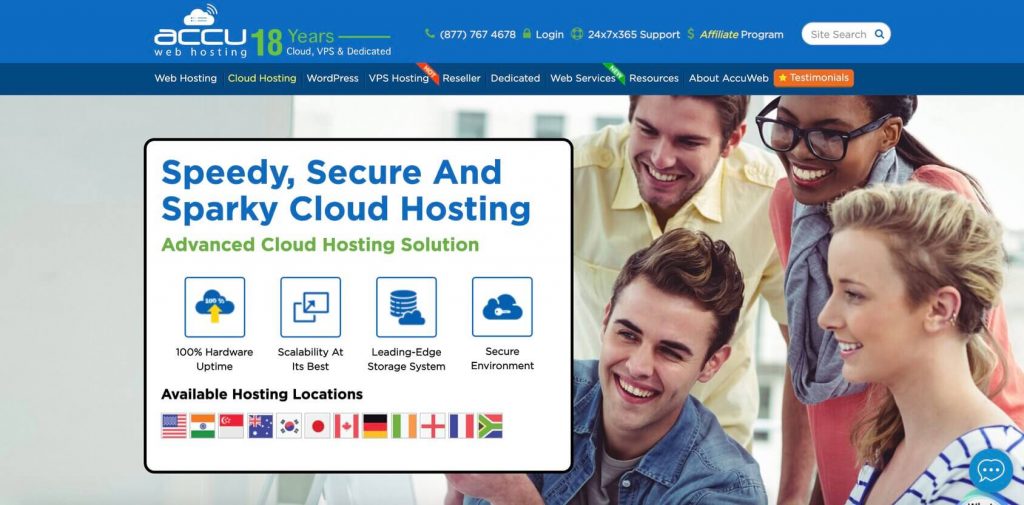
AccuWeb Hosting was established in 2003 and made quite a name for itself. It provides both Linux and Windows cloud hosting solutions to ensure all of your needs are met. AccuWeb Hosting’s key features include:
- Windows and Linux cloud hosting;
- Extensive configuration options;
- DDoS protection;
- Scalability options; and
- 12 storing locations.
Pricing comparison:
| Basic plan | Standard plan | Pro plan | Expert plan | |
| SiteGround | $100/month (monthly term) | $200/month | $300/month | $400/month |
| Cloudways | $10/month (monthly term) | $22/month | $42/month | $80/month |
| AccuWebHosting | $5.09/month – Windows (3 yrs term) | $7.49/month | $14.49/month |
Dedicated hosting
Dedicated hosting is often one of the most expensive options. Still, it’s the best solution for larger websites that need more freedom. You can get dedicated hosting from:
1. Bluehost – Starting at $79.99 per month

Bluehost is a fan favorite across categories. It’s one of the most recognized names in the web hosting industry, serving millions of customers worldwide. Some of the key features of Bluehost include:
- Easy setup;
- Extreme speed;
- Root access;
- Dedicated support; and
- Available storage upgrades.
2. GoDaddy – Starting at $129.99 per month
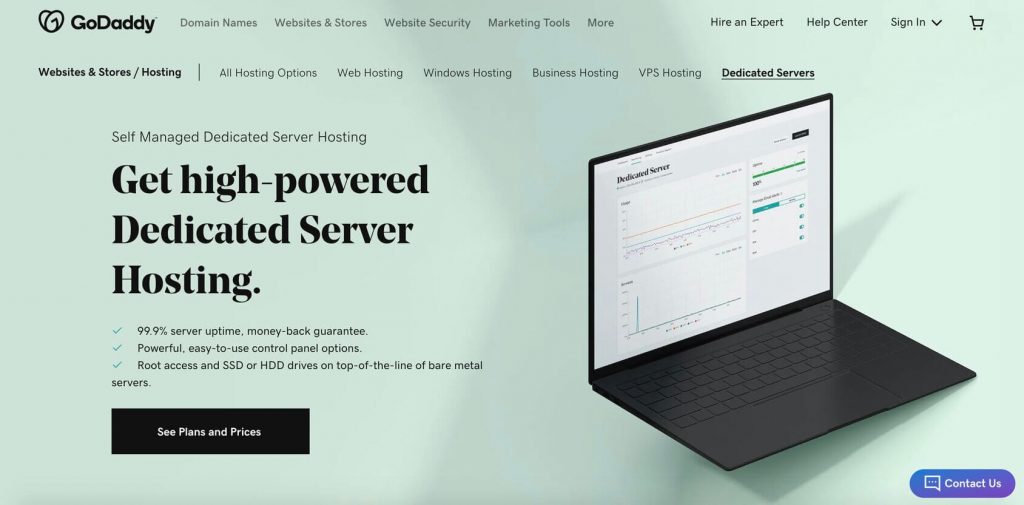
GoDaddy is perhaps the best-known web hosting services provider. It’s a beginner-friendly solution that will ensure your site reaches its full capacity. With GoDaddy, you can enjoy:
- 99.9% server uptime;
- Advanced network security;
- Free SSL certificate;
- Server configuration options; and
- Dedicated hosting support.
3. A2 Hosting – Starting at $129.99 per month
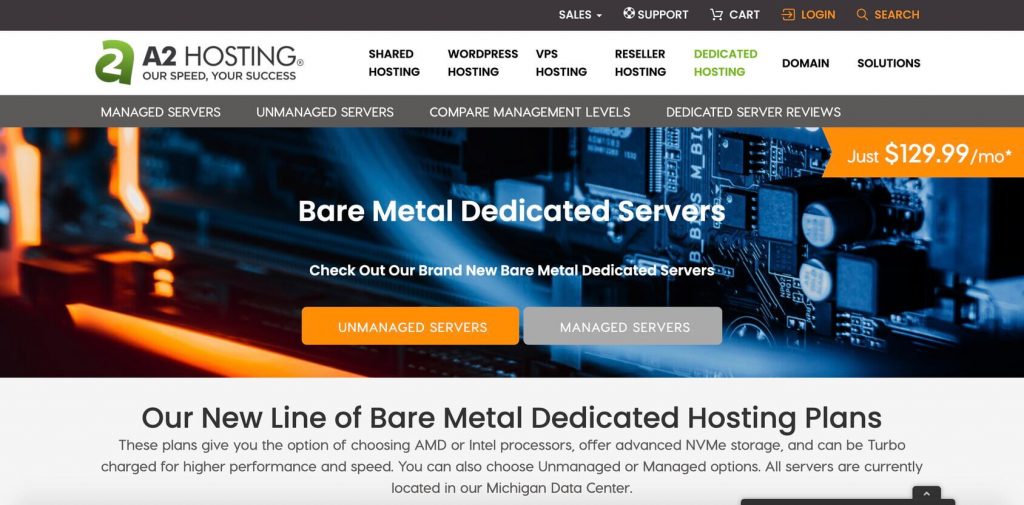
A2 Hosting boasts excellent speeds and impeccable support. It has servers around the world, so you can choose the one that’s closest to you. With A2 Hosting, you’ll enjoy:
- High performance;
- NVMe storage options;
- 99.9% uptime;
- RAM starting from 16GB; and
- BDM servers.
Pricing comparison:
| Basic plan | Standard plan | Pro plan | Expert plan | |
| Bluehost | $79.99/month (3 yrs term) | $99.99/month | $119.99/month | n/a |
| GoDaddy | $129.99/month (2 yrs term) | $169.99/month | $299.99/month | $399.99/month |
| A2 Hosting | $129.99/month (2 yrs term) | $199.99/month | $199.99/month | $219.99/month |
Managed hosting
Finally, managed hosting could be the best option for businesses that need a bit of help running their dedicated servers. You’ll find managed hosting with:
1. WP Engine – Starting at $22.50 per month
WP Engine is perhaps the most renowned managed hosting services provider. It’s ideal for beginners and experts alike and provides you with an array of features:
- Free SSL and SSH;
- Daily backups;
- 10 premium themes;
- One-click staging site; and
- Up to 500GB bandwidth.
2. Liquid Web – Starting at $15.83 per month
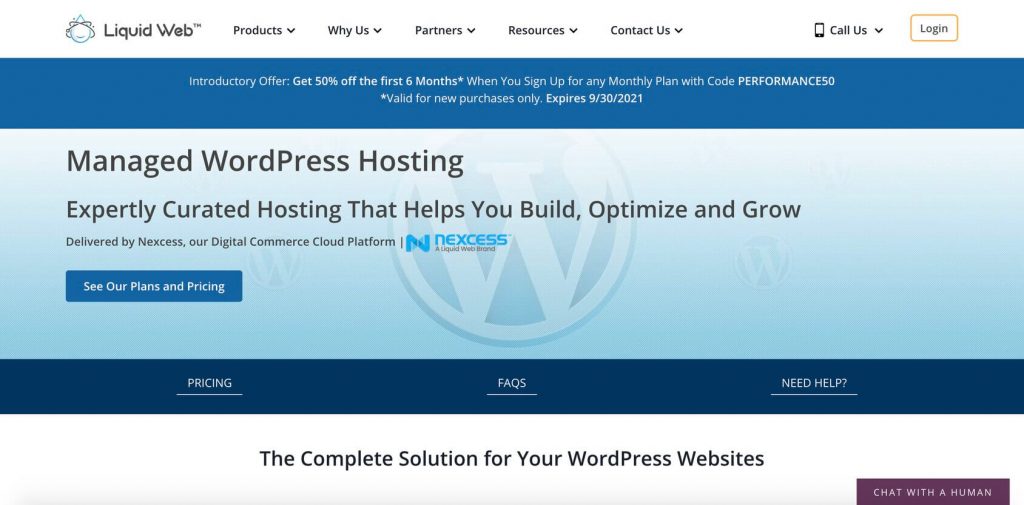
Liquid Web is one of the veteran services, established in 1997. It prioritizes seamless performance, excellent uptimes, and the highest security. Some of its features include:
- Free site migration;
- 24/7 expert support;
- No traffic limits;
- SSH, Git, and WP-CLI access; and
- iThemes Security Pro and iThemes Sync.
3. Kinsta – starting at $30 per month
Kinsta is a relative newcomer, established in 2013. Headquartered in the UK, it has servers around the world and offers the best quality of service. With Kinsta, you’ll be getting:
- Uptime checks every 2 minutes;
- Daily backups;
- Flexible scalability options;
- Proactive hacking prevention; and
- SSD storage starting from 10GB.
Pricing comparison:
| Basic plan | Standard plan | Pro plan | Expert plan | |
| WP Engine | $22.50/month (1 year term) | $44.25/month | $86.25/month | $217.50/month |
| Liquid Web | $15.83/month (1 year term) | $65.83/month | $90.83/month | $124.17/month |
| Kinsta | $30/month (monthly term) | $60/month | $100-$400/month | $600-$1,500/month |
FAQs
Yes, every website needs hosting, but it is possible to do it without a hosting service provider. Technically, your computer could act as a hosting server. It wouldn’t be very efficient, and it wouldn’t be able to handle much traffic or allow for much data transfer, but it could keep your site online.
Yes, there are many free hosting options, with even sites like WordPress and Wix offering free hosting to their users. However, free hosting often leaves much to be desired. You’ll have a cap on storage and bandwidth, your domain name options will be limited, privacy and security will be subpar, and overall performance will be much lower than you’d want. Free hosting is a good choice if you’re just getting started and need time to get acquainted with running your website. However, upgrading to a paid, higher-quality service is necessary as soon as you begin attracting website traffic.
Hosting doesn’t always include a domain name. In most instances, a hosting service provider will offer a free domain name of your choice for the first year, then charge a renewal fee, but you don’t have to use this service. You can buy a domain name from one company, then have your site hosted on another company. However, this is neither efficient nor affordable as hosting providers typically have much better prices for domain names when they come with hosting services.
Conclusion
Finding the right web hosting solution at the right price can be quite a challenge. It’s in your best interest to devote time and effort to assessing your needs and comparing the different solutions available to you. Make sure that your web host checks all of your boxes and allows you to scale up as you grow.
